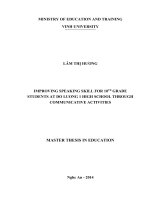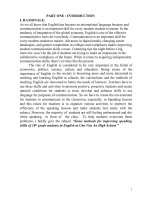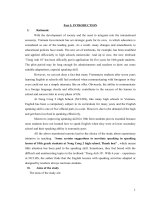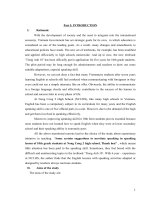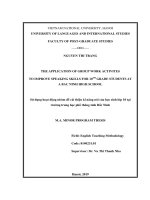Some certain suggestions to movitate speaking in speaking lesson of 10th grade students at nong cong 2 high sch
Bạn đang xem bản rút gọn của tài liệu. Xem và tải ngay bản đầy đủ của tài liệu tại đây (495.29 KB, 16 trang )
Part I: INTRODUCTION
I.
Rationale
With the development of society and the need to integrate into the international
economy. Vietnam Government has set strategic goals for its own, in which education is
considered as one of the leading goals. As a result, many changes and amendments to
educational policies have made. The new set of textbooks, for example, has been modified
and applied officicially in high schools nationwide. And up to now, the new textbook
‘Tieng Anh 10’ has been officially put in application for five years for 10th grade students.
The pilot period may be long enough for administrators and teachers to draw out some
suitable adaptations, especial speaking skill.
However, we can not deny a fact that many Vietnamese students after seven years
learning English at schools still feel confused when communicating with foreigners or they
even could not say a simple utterance like an offer. Obviously, the ability to communicate
in a foreign language clearly and effectively contributes to the success of the learner in
school and success later in every phase of life.
At Nong Cong 2 High School (NC2.HS), like many high schools in Vietnam,
English has been a compulsory subject in its curriculum for many years and the English
speaking skill is one of five official parts in a unit. However, due to the demand of the high
and get them involved in speaking effectively.
Moreover, improving speaking skill for 10th form students proves essential because
most students have not learned how to speak English when they were at lower secondary
school and their speaking ability is extremely poor.
All the above mentioned reasons lead to the choice of the study about exprerience
initiative in teaching ‘Some certain suggestions to movitate speaking in speaking
lesson of 10th grade students at Nong Cong 2 high school, Thanh hoa” , which means
little attention has been paid to the speaking skill. Sometimes, they feel bored with the
difficult and uninteresting topics in the textbook ‘Tieng Anh 10’. With 6 year – experience
in NC2.HS, the author finds that the English lessons with speaking activities adapted or
designed by teachers always motivate students
II.
Aims of the study
The aims of the study are:
1
- to investigate students’ difficulties in learning English oral skills and the current
situation of teaching the speaking activities to the 10-form students by teachers at
Nong Cong 2 High School.
- to adapt some speaking activities based on “Tieng Anh 10” to reduce 10th grade
students’s difficulties in learning English oral skills at Nong Cong 2 high school.
III.
Scope of the study
This initiative is carried with no hope that can cover all kinds of English speaking
activites because this is a board aspect investigated by many authors. The authors’s
attempt is only to adapt some difficult speaking activities in “Tieng Anh 10” to reduce
students’s difficulties and make them more interested and active in English lesssons,
thus, improving their speaking ability.
IV.
Research questions
1. What are students’ difficulties in learning the current English speaking activities
in ‘Tieng Anh 10’?
2. Which speaking lessons (in 16 units of Tieng Anh 10) are difficult for the
students at NC2HS?
3. What speaking activities in the textbook “Tieng Anh 10”should be adapted to
reduce students’ difficulties?
V.
Research methodology
To achieve the aims mentioned above, the study employed survey questionnaire for
students, interview for teachers and classroom observations to collect information on the
the students’ difficulties and seeks a way to reduce those difficulties by adapting some
unsuitable textbook pre-designed English speaking activities in “Tieng Anh 10”.
2
Part II: DEVELOPMENT
I. The purpose of material adaptation.
In reality, a textbook can never totally be an effective tool for teachers to follow
without any adaptation because of its intrinsic deficiencies such as linguistic inaccuracies,
out-of-datedness, lack of authenticity or lack of variety. Thus, I favor Madsen and Bowen’s
(1978) and Tice’s (1991) view that is the purpose of material adaptation is to compensate
for those deficiencies. This is important to all teachers of English because it can activate
learners and stimulate their motivation, and increased motivation, in turn, is likely to create
a more conductive classroom atmosphere.
II. Categories of English speaking activities
Discussion
* Conversation
Storytelling
* Oral reports
Telephoning
* Announcements
Role play
* Interviews
* Co-operative learning
Informal Debate
III. Problems with English speaking and speaking activities
1. Problems with English speaking
Everything has bad and good sides. Speaking also has its own problems.
According to Brown (1994: 256), the characteristics of spoken language can make oral
performance easy as well as in soe cases difficult. There are following problems with
speaking:
Clustering
* Redundancy
Reduced forms
* Colloquial language
Stress, rhythm and intonation
* Affective factors
Interaction
2. Problems with English speaking activities
It is more difficult to design and adminster such activities than to do so for listening,
reading or writing. Teachers often come across the problems that Ur (1996:121) lists out:
Inhibition
* Nothing to say:
Lows or uneven participation
* Mother-tongue use:
3
Basing on these views, an action research is to caried out on adapting some English
speaking activities for the ‘Tieng Anh 10’ to reduce these difficulties.
PART III – DATA ANALYSIS
1. Questionnaires.
The questionnaires for teachers and students consist of 5 and 7 questions respectively to
collect information focusing the following categories: (see appendix 1 and appendix 2).
-
The effectiveness of communicative activities in the textbook ‘Tieng Anh 10.
-
Students’ perceptions of their difficulties in English speaking skills
-
Necessity of changing or adding English speaking activities
-
Students’ attitudes towards applying changing or adding English speaking
activities and their effectiveness.
-
Changing or adding English speaking activities applied by teachers and the
ones chosen by students.
2. The effectiveness of communicative activities in the textbook ‘Tieng Anh 10.
Question 1 in both questionnaires asks about the teachers’ and students’ viewpoints on the
effectiveness of the speaking activities presented in 16 units of ‘Tieng Anh 10’.
Chart 1. The effectiveness of communicative activities in the textbook ‘Tieng Anh 10.
Most of the teacher (81.25%) and the students (72%) agree that they are not very
effective when being taught at NC2. HS, although the new textbook ‘Tieng Anh 10’ is
interesting. According the teachers, there are some reasons for this. First, some activities in
4
the text book are not suitable to rural students of NC2. HS, for example some topics are
unfamiliar to them.
3. Changing or adding English speaking activities applied by teachers and the ones
chosen by students.
The next two questions in the questionnaire for students aim to investigate the types
of changing or extra oral activities the teachers have applied in the classroom with the
textbook ‘Tieng Anh 10’ and the types students believe to be effective when applied in
this textbook.
Types of English speaking activities
Changed by
Supported by
teachers (%)
students(%)
Games
13
34
Information gap
33
41
Discussion
32
46
Role play
49
47
Story telling
7
11
Oral report
9
14
Telephoning
6
15
Drama in context
1
0
Informal Debate
8
12
Co-operative learning
12
33
Solving – problem
7
13
Announcements
1
1
Interviews
27
40
Table 4: The English speaking activities adapted by teachers and the changing
activities in tasks of speaking lessons in ‘Tieng Anh 10’ chosen by students.
The table reveals that the teachers have applied most categories of the speaking
activities above. This is very helpful because students can provide the designer with
helpful information about the effectiveness of each activity when applied in ‘Tieng
Anh 10’. As seen in the table, students show their most interest in the categories of
information gap, discussion, role play and interview
4. Changing or adding English speaking activities chosen by teachers and their reasons.
Question 3 and 4 in the questionnaire for teachers were
designed to get their advice on the types of changing or extra
speaking activities for the textbook ‘Tieng Anh 10’ and the
reasons for these.
5
Types of English
Reasons
Supported
speaking activities
by
teachers(%)
12.50%
Games
It is very interesting but time-consuming and not
Information gap
profitable.
It is easy to prepare and carry out. It is also
56.25
Discussion
reasonable for students’ language level.
Many students can participate in speaking
68.75
activities. Students like this way. It gives students
Role play
high motivation of brains.
This activity is very useful. Students can practice
75.00
Story telling
English phrases or structures in certain situations.
It is time-consuming to prepare and practice at
10.50
Oral report
Telephoning
Drama in context
class.
It takes much time to prepare and carried out.
It is time-consuming and difficult.
It is difficult for students and they have to cope
8.25
12.25
0
Informal Debate
Co-operative learning
with the lack of vocabulary.
It is time-consuming and difficult.
It helps students work together and support each
0
45.50
Solving – problem
other.
It is quite interesting and give students high
12.50
motivation of brains but students sometimes lack
Announcements
Interviews
vocabulary of English and social knowledge.
It is difficult.
The activity is profitable and it makes students
0
56.25
more confident. It is a good way to provide
students chances to practice speaking English.
Table 5: The English speaking activities for ‘Tieng Anh 10’ chosen by teachers.
5. Follow-up class observation
In 8 speaking periods which author visited, English speaking activities such as
information gap, role playing, describing pictures and co-operative learning always applied
(7 periods) instead of task 2, or 3 in textbook.
The class observation also reveals that teachers need to have good preparation for prespeaking to make the speaking activities more effective such as providing students key
words relating to the topic, giving clear instructions...
6
6. Feedback of students towards applying changing or adding English
speaking activities and their effectiveness.
Chart 3. Students’ feedback towards applying changing or
adding English speaking activities and their effectiveness.
PART IV - SUGGESTED ADAPTATIONS OF TEXTBOOK ENGLISH SPEAKING
ACTIVITIES
In this part, some most common and effective activities such as role play,
discussion, information, telephoning, co-operative learning, interviews are presented. The
author’ own experience suggests that these activities work effectively when applied to
textbook ‘Tieng Anh 10’ to motivate the 10th form students at NC2.HS in speaking lessons.
V.1. ROLE PLAY
V.1. 1.Activities 1
Application: Task 3 - Unit 6: An excursion
Aims: Giving opinions, expressing agreement and disagreement
Class time: 20 minutes
Materials: English textbook 10, page 66
Source: Section cards and role cards (See Appendix 6)
Procedure:
1. Copy and cut the 4 role cards of each people and the 6 section cards.
2. Divide the class into group of four (or three if there are only three students left).
Give each group one set of role cards and one set of situation cards (for group of three,
leave out role card D)
3. Ask the students to sit round the table with the situations cards face down in a pile in
the middle of the table. The cards should be in order from 1 to 6. Each student should
have a role card 1, 2, 3 or 4.
7
4. Tell the students that it is Sunday morning and Tim’s class is going on a boat on
Lake Michigan in Chicago. Read the seat plan. You suggest the best seat in each
section for each person.
5. The object of the game is using structures ‘… think …‘should’ or should not…
because’. Or giving opinions via answers ‘Yes’, ‘No’. basing on the content of textbook
‘Tieng Anh 10’.
6. The game is finished when they have successfully decided on each people’s seat.
Ask groups their decision on some sections and check with the whole class.
V.1.2. Activities 2
Application: Task 2 – Unit 3: People’s background
Aims: to encourage students to find out information related to their friends’ background
for their presentation next task.
Level: Elementary
Class time: 10 minutes
Materials: English textbook 10, page 35
Source: English Textbook 10, Education Press, 2006 (See Appendix 7)
Procedure:
1. The teacher elicits situation and ask students to make questions basing on given
information, for example:
2. The teacher introduce some special expression for students to do the natural
conversation.
3. Students work in pairs to do the interview
4. Teacher walks around to encourage and help students if necessary
5. Teacher calls some pairs to do the interview before class.
After doing this task, students can collect information to talk about the friend they have
interviewed for reporting at the end of the lesson. Most students are eager to do the task
because they can do it in role of the interviewers.
V.2. INFORMATION GAP
V.2.1. Activities 1
Application: Task 3 – Unit 1: A day in the life of …
Aims: Talking about daily activities.
8
Class time: 10 minutes
Materials: English textbook 10, page 14
Source: Role cards (See Appendix 8)
Procedure:
1. Copy the two role cards. They are the same but some information is missing from
each.
2. Ask students to work in pairs. Give each pairs the 2 role cards.
3. Tell the students to complete the form by asking and answering their partner’s
questions.
e.g. A: What does Tom do after school?
B: He often does exercise.
4. Tell the students to write the answers in the boxes or draw the picture.
5. Ask the students to write his/ her partner’s name in the last box and ask him/ her the
same questions to complete the boxes.
6. The activity is finished when students have completed all the missing information.
Tell students to stand up and make full sentences about the characters in the cards.
V.2.2. Activities 2
Application: Task 2 – Unit 15: Cities
Aims: Comparing two cities
Class time: 15 minutes
Materials: English textbook 10, page 159
Source: Role cards – Cities (See Appendix 9)
Procedure:
1. Copy the two role cards - cities. They are the same but some information is missing
from each.
2. Ask students to work in pairs. Give each pairs the 2 role cards.
3. Tell the students to complete the form by asking and answering their partner’s
questions.
e.g. When was New York founded?
What is population of New York?
How many national holidays are there in New York?
9
5. The activity is finished when students have completed all the missing information in
their cards.
6. Ask some students to stand up and talk about the person they have asked their
partners to get the information about their cities.
V.3. CO-OPERATIVE LEARNING
V.3.1. Activity 1
Application: Task 1 – Unit 5: Technology and You
Aims: Asking for and giving information about the uses of modern inventions.
Class time: 10 minutes
Materials: English textbook 10, page 56
Source: Modern inventions Cards (See Appendix 10)
Procedure:
1. Copy and cut out the 18 modern invention cards above
2. Divide the class into groups of six (or five if there are only five students left). Give
each group one set of job cards.
3. Tell the students to put cards face down on the table
4. Ask students to take it turn to pick up a card and ask and answer about the uses of
modern inventions. Put some helpful language on the board for them to refer to:
A: Can/ Could you tell me what ……………………… is used for?
B: It is used to ……………………………………………………....
5. The activity is finished when each student has said at least one thing about each of the cards.
6. Ask one group to stand up and say about one of the modern inventions in the cards.
Ask the other groups to add more information.
V.3.2. Activity 2
Application: Task 2 – Unit 11: National Parks
Aims: Expressing regrets. (using the conditional sentence type 3)
Class time: 15 minutes
Materials: English textbook 10, page 115
Source: Situation cards - List of wishes (See Appendix 11)
Procedure:
1. Copy the list of wishes and the situation cards, cut out the situation cards
10
2. Divide the class into groups of six (or five if there are only five students left). Give
each student a list of wishes and two situation cards .
3. Tell the students to complete their list of wishes by saying according to model
others in their group:
e.g. If we had not …., we wouldn’t have …
4. When students have completed all the missing information in their list of wishes,
ask them to tell their group the most interesting or surprising wisher they have
known.
V.4. DISCUSSION
V.4.1. Activity 1
Application: Task 3 – Unit 8: The story of my village
Aims: Talking about plans and possible results (in the village).
Class time: 10 minutes
Materials: English textbook 10, page 85
Source: Question Cards (See Appendix 12)
Procedure:
1. Copy, cut out and shuffle question cards.
2. Divide the class into groups of four (or three if there are only three students left).
Give each group one set of question cards
3. Ask students to sit round the table with the question cards face down in a pile in the
middle of the table. One student starts by turning up the top card, reading it out to
the group and discussing their plans and possible results. The next student now
picks up a card, reads it out … and the activity continues.
4. Stop the students at the end of the time limit.
5. Ask each group in turn which question card gave rise to most discussion.
V.4.2. Activity 2
Application: Task 3 – Unit 9: Undersea World
Aims: Reporting on discussion results
Class time: 15 minutes
Materials: English textbook 10, page 97
11
Source: Situation Cards (See Appendix 13)
Procedure:
1. Copy and cut out the 5 situation cards.
2. Divide the class into groups of four (or three if there are only three students left).
Give each group one set of situation cards
3. Ask students to turn up the first card and compare four situations on the card to find
out solutions. Encourage them use ‘should’ and ask groups exchange situations,
then discuss again.
4. When the time is over, find out the best solutions.
V.4.3. Activity 3
Application: Task 2 – Unit 14: The World Cup
Aims: Asking and answering questions about the World Cups
Class time: 20 minutes
Source: Handouts (See Appendix 14)
Procedure:
1. Copy handouts.
2. Divide the class into groups of six (or five if there are only five students left). Give
each group two handouts
3. Tell students to complete their handouts by asking and answering the others in their
group such as:
A: Where was the first World Cup held?
B: It was held in Uruguay.
A: Which teams played in the final match?
B: Uraguay and Argentina.
A: Which team became the champion?
B: Uraguay
A: What was the score of the match?
B: 4 - 2
4. When students have completed all the missing information in their handouts, ask
them add more information about famous football team if they know.
V.5. INTERVIEWS
12
5.1. Activity 1
Application: Task 2 – Unit 4: Special Education
Aims: Making an interview.
Class time: 20 minutes
Materials: English textbook 10, page 48
Source: Handouts (See Appendix 15)
Procedure:
1. Copy and cut out the six handouts.
2. Divide the class into groups of six (or five if there are only five students left). Give
each student one of the six handouts.
3. Explain that each student has some questions in their handout, ask them to
interview four other people in their group and make a note of answer they get.
4. Stop the students at the end of the time limit whether they have finished or not. Ask
some students to stand up and present their work.
PART V: REACHED RESULTS
All in all, the teaching experiences help the reseacher confirm the fact that prelistening techniques applied by the teacher have great impact to students’ motivation
before they start listening. And this is the result compared by the previous years 2016
-2017
Speaking Skills
Before
Class
Class
Rank
Excellent
techniques(20162017)
6.81%
After
(2018-2019)
23.68%
13
10A1
(49
students
Class
10A4
(50 sts)
Class
10A6
(44 sts)
Good
Medium
Weak
Bad
Excellent
Good
Medium
Weak
Bad
Excellent
Good
Medium
Weak
Bad
40.90%
50%
2.27%
0%
2.27%
34.1%
56.81%
4.54%
0%
3%
25%
57%
15%
0%
62.27%
4.05%
0%
0%
4.54%
69,99%
25.45%
0%
0%
6%
30%
62%
2%
0%
PART VI: CONCLUSION
As teachers of English at a rural school, we have faced many obstacles in
developing students’ speaking skill, and the desire of how to improve the effectiveness of
speaking lessons is really the strong motivation. This study aims at investigating the
necessity of adapting speaking activities (in tasks of speaking lessons), finding how to
adapt them and then suggesting some appropriate speaking activities for textbook ‘Tieng
Anh 10’to help the 10th Nong Cong 2 students have more chances to practice speaking and
improve their speaking ability. The research has discovered the significant findings:
First, the communicative activities presented in some tasks in speaking lesson in
‘Tieng Anh 10’ are not effective because they are not varied and interesting enough to
attract the students’ concentration or some topics are not familiar to them due to the low
background knowledge of rural students, generally. Therefore, to motivate students in
speaking lessons, it is vitally necessary to adapt these speaking activities.
Secondly, the students’ favorite speaking activities except for games are also highly
appreciated by the teachers. Moreover, these activities get them not bored and make them
14
more confident. However, games are not always profitable and very time-consuming
though they are very interesting and attract students’ attention.
According to the findings, it can be concluded that teachers should adapt speaking
activities to increase the effectiveness of speaking lessons. However, teachers play a key
role which can affect the success or failure of the changing speaking activities. Therefore,
teachers should have good preparation for pre-speaking, good organization of group or pair
works.
Nong Cong, May 25th 2019
Signature
Nguyễn Thị Thu Hằng
Teacher of English at Nong Cong 2 high school
REFERENCES
1. Bailey, K.M. and Savage, L. (1994). New Ways in Teaching Speaking.USA.
2. Byrne, D. (1991). Teaching Oral English. Longman.
3. Hadfield, J. (1985). Elementary Communication Games. Thomas Nelson and Sons
Ltd.
4. Hoa, H.X., et al (2004). Tài Liệu Bồi Dưỡng Giáo Viên Dạy Sách Khoa Lớp 10 –
Môn Tiếng Anh. The Ministry of Education and Training.
5. Jones, L. (2002). Let’s Talk 2: Teacher Support Site. Cambrigde University Press.
15
6. Ellis, M. (1986: 47). Making and shaping games. How to adapt. University of
Technology, Loughborough.
7. Madsen, K.S., &Bowen, J.D. (1978). Adaptation in Language Teaching. Rowley,
MA: Newbury House.
8. Nunan, D. (1989). Designing Tasks for the Communicative Classroom. Cambrigde
University Press.
9. Van, H.V., et al (2006). Tiếng Anh 10. Education Publishing House of Vietnam.
10. Wallwork, A. (1994). Discussions A-Z Advanced: A Resourse Book of Speaking
Activities. Cambrigde University Press.
11. Watcyn-Jones, P. (1995). Grammar Games and Activities for Teachers. Penguin
Books.
Websites:
16

